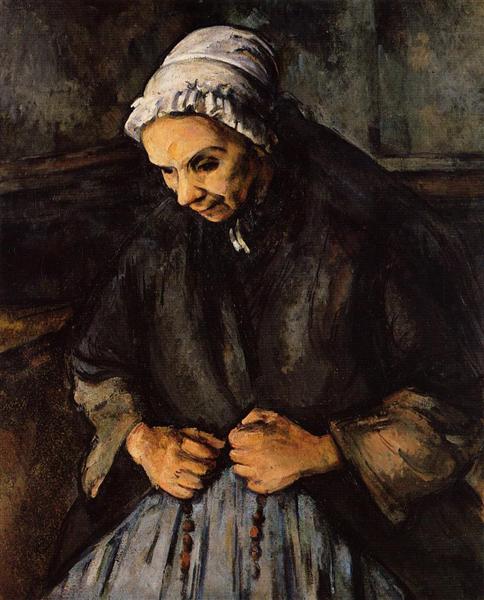Description
Paul Cézanne's Old Woman with a Rosary, painted in 1896, offers a fascinating insight into the use of color and form, characteristics that defined the post-impressionist master's style. In this painting, Cézanne portrays an older woman, whose figure occupies the center of the canvas. Her austere expression, combined with the palpable texture of her skin, suggests a life full of experiences. The old woman holds a rosary in her hands, a symbol of tranquility and spiritual contemplation that seems to contrast with the brusqueness of her face, suggesting a narrative depth that invites reflection on life and faith.
The treatment of colour in this work is exemplary of Cézanne's technique, which is characterised by his analytical approach and the application of patches of colour. The palette is rich, with earthy tones predominating, evoking a sense of warmth and solidity. The nuances on the old woman's face, ranging from ochre to crimson, allow us to appreciate the light playing on her skin, creating a remarkable volumetry. The way Cézanne uses colour to model form is a testament to the move towards a new representation in art, where form is not defined only by its outline, but also by its own colouring and the interplay of light and shadow.
The background of the painting is equally significant, with a deliberate use of darker colours that evoke an intimate and almost mystical atmosphere. This context highlights the figure of the old woman, and suggests a space within private life. The simplicity of the background contrasts with the complexity of the character, emphasising her solitude and grandeur. Furthermore, the way Cézanne sets up the composition, centring the figure on the canvas, makes it an unavoidable focus of attention, a resource that allows the viewer to emotionally connect with the work.
Through the portrait of this woman, Cézanne also speaks to us about time. It is a reflection of his own struggle with the temporality of art; the representation of old age is a reminder of the fragility of life. In the use of the rosary, there is a subtlety that invites meditation, emphasizing the act of praying, which can be interpreted as a search for meaning in a changing world. In this sense, "Old Woman with a Rosary" is a profound exploration of spirituality, memory and personal experience.
Similar works by Cézanne, such as his landscapes and still life studies, also show an interest in texture and structure. In his search for a new way of seeing the world, Cézanne moved away from Impressionism at its height, seeking instead an approach more focused on geometry and simplification of form. This work is a compendium of this artistic journey, where each brushstroke contains the essence of what it means to observe and understand the world.
"Old Woman with a Rosary" is a testament to Cézanne's mastery and his ability to fuse technique with a deep emotional charge, taking the viewer on an aesthetic experience that transcends time. Through this painting, we can glimpse the concerns of an artist who, at the end of the 19th century, tried to leave his mark on art, proposing a revaluation of the portrait and the exploration of the human condition. This work, like many others by Cézanne, stands as a fundamental pillar in the history of art, influencing and paving the way for future generations.
KUADROS ©, a famous painting on your wall.
Hand-made oil painting reproductions, with the quality of professional artists and the distinctive seal of KUADROS ©.
Painting reproduction service with satisfaction guarantee. If you are not completely satisfied with the replica of your painting, we will refund 100% of your money.

